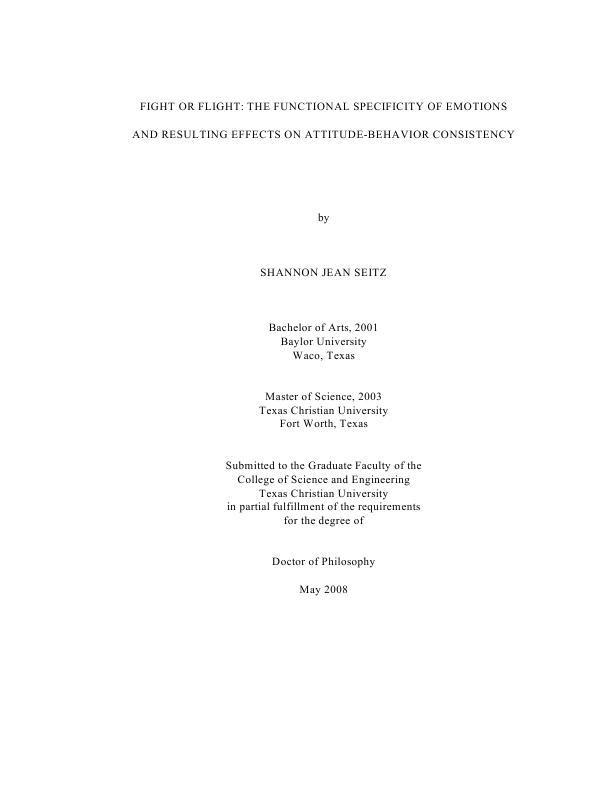Fight or flight: the functional specificity of emotions and resulting effects on attitude-behavior consistencyShow full item record
| Title | Fight or flight: the functional specificity of emotions and resulting effects on attitude-behavior consistency |
|---|---|
| Author | Seitz, Shannon Jean |
| Date | 2008 |
| Genre | Dissertation |
| Degree | Doctor of Philosophy |
| Abstract | Past research on the emotions associated with attitudes has investigated the extent to which specific types of emotions lead to actions (Seitz, Lord & Taylor, 2007). The present research extends this past research by showing that emotions engender a functional specificity with consequences for attitude-behavior consistency. In addition, the present research extends Attitude Representation Theory (Lord & Lepper, 1999) by showing that some emotions included in the attitude object's representation may involve specific action tendencies (reward/punish; approach/avoid) that result in consequences for attitude-behavior consistency. Experiment 1 employed an emotion manipulation. Participants were primed to associate either the emotion fear or the emotion anger with their attitudes.^Experiment 2 borrowed from the literature on prejudice (Cottrell & Neuberg, 2005), using social groups known to elicit specific emotions (African Americans: Fear, Activist Feminists: Anger).^The central hypothesis--that specific emotions associated with an attitude target can elicit specific behaviors and in turn result in better attitude-behavior consistency--was partially supported. In Experiment 1, participants primed to associate fear with Mexican Americans later reported relatively high levels of fear and concerns about personal safety, as well as relatively high levels of attitude-behavior consistency on approach-avoidance measures. Those primed to associate anger with Mexican Americans did not do so, but they did display relatively high levels of attitude-behavior consistency on reward-punish measures.^Experiment 2 replicated earlier findings that people associate more fear and safety concerns with African Americans, but more anger and threats to their rights with Activist Feminists.^They also displayed marginally higher attitude-behavior consistency with Activist Feminists than African Americans on reward-punish than approach-avoidance measures, although the attitude-behavior consistency results were not supported for behaviors toward African Americans. |
| Link | https://repository.tcu.edu/handle/116099117/4104 |
| Department | Psychology |
| Advisor | Lord, Charles G. |
Files in this item
This item appears in the following Collection(s)
- Doctoral Dissertations [1526]
© TCU Library 2015 | Contact Special Collections |
HTML Sitemap



